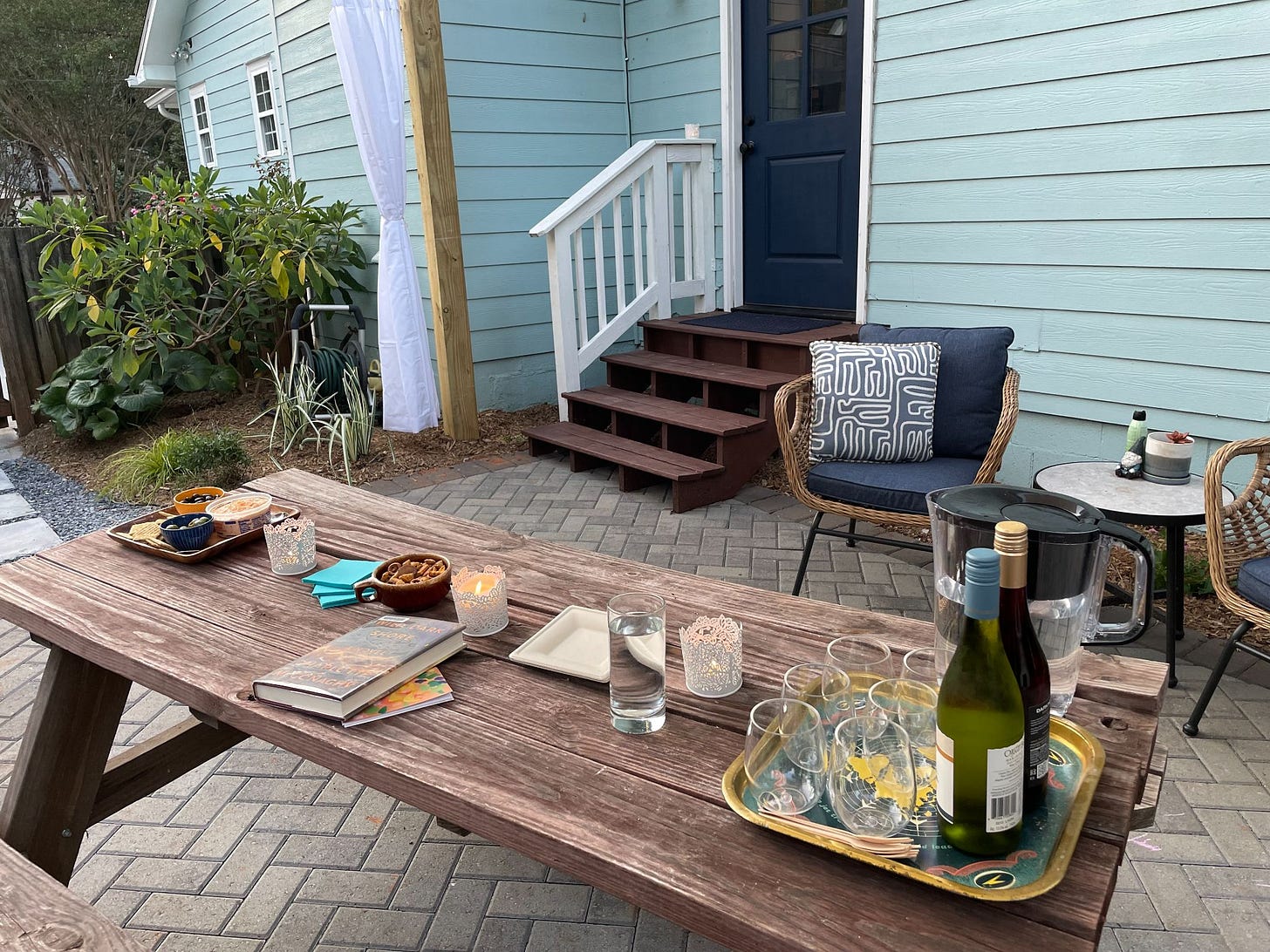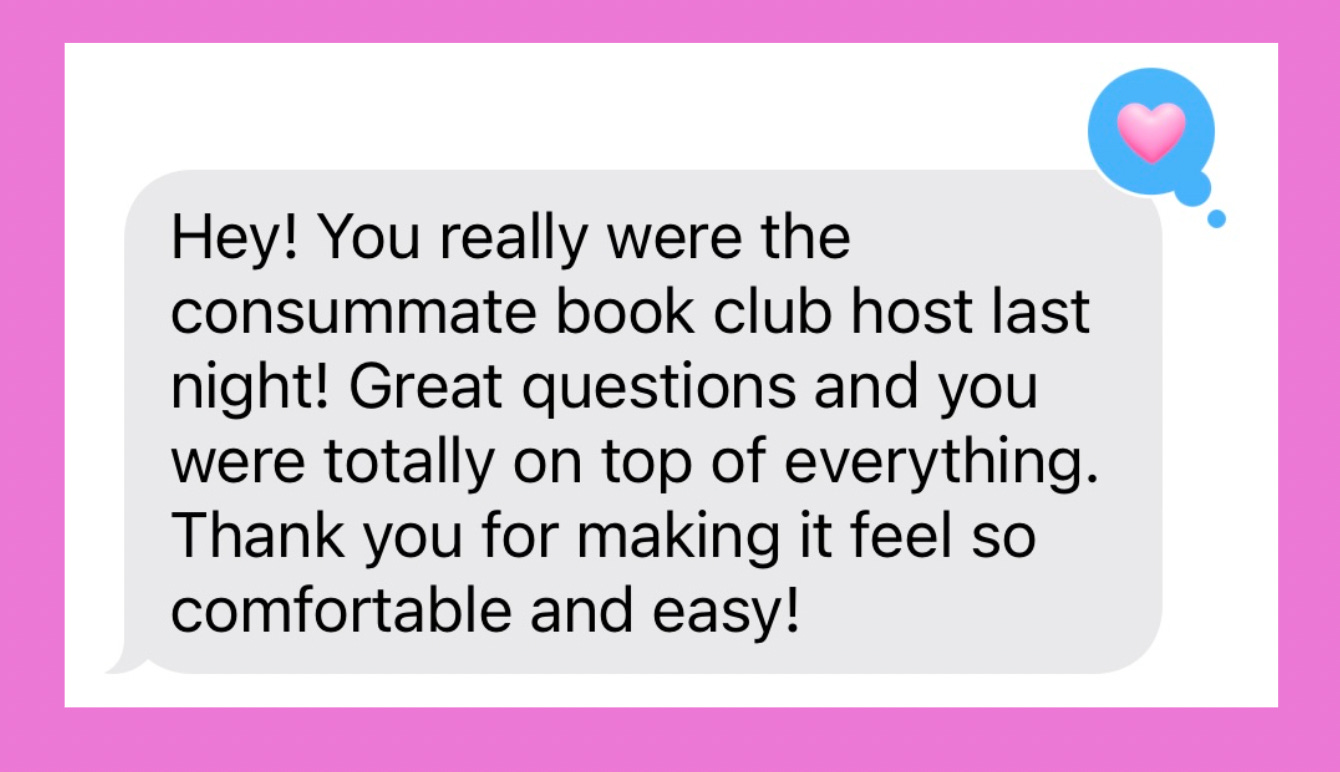Everything is broken. Will a book club help?
It sure won’t hurt.
On Sunday night, I hosted five friends in my backyard to talk about Wild Dark Shore — our September book club pick. We sat on the patio, which looked different than it had just days before: large posts now held a shade sail and string lights, and fresh greenery filled the gap where our old chinaberry tree once stood.
I was equal parts excited and nervous — eager to show off the transformed space, but mostly to discuss a novel I adored. As a longtime book clubber, I know the drill: it's vulnerable to gush about a book you love. There’s always the risk that others don’t feel the same.
I inhaled Wild Dark Shore, racing through pages and underlining favorite passages. Then I dove deeper: listening to podcasts, reading author interviews, even looking up articles about Macquarie Island, the penguin-filled enclave that inspired the setting. I filled a tiny notebook with quotes and talking points, fuel for what I imagined would be an enthusiastic discussion.
“So, what did everyone think?” I asked, nodding from person to person as they shared their take.
By the fourth response, it was clear I was in the minority. Everyone had quibbles; a few had major issues with the plot. I was the only person who enthusiastically loved the book — and I was suddenly self-conscious about it. As the critiques kept coming, I quietly slid my notebook out of sight.
Hiring landscapers to install the shade sail and replant the yard was an expensive project, one I’d been working overtime to save for. Still, Billy and I decided it was well worth it — without shade, we rarely spent time outside.
So I made the hefty deposit, weighed in on the design, and, when things didn’t go as planned, began to spiral.
The first snag hit on Wednesday. The original design — two overlapping triangle sails — left a gaping hole in the middle. Harsh sun poured through the exact spot where we needed the most relief.
Also on Wednesday, a polarizing political figure was shot and killed.
I won’t get into the mechanics of shade sails, and I won’t wade into the fraught politics of Charlie Kirk. All I will say is that news of his death — like any shooting — made me anxious and unsettled. I worried about the backlash. I worried about his family. I worried about a country that already feels fractured beyond repair, overloaded with grief and disconnection.
But I didn’t say any of this out loud. I didn’t journal, or meditate, or ask for a hug.
I focused on the damn shade sails instead.
I sent frantic texts to friends. Lost precious sleep. Talked far too long about hardware and tensioning systems at a coffee date.
It’s a familiar cycle: when the world feels terrifying, I soothe my anxiety by clinging to something I believe I can control.
"The evening reminded me how vital it is to sit with differences — to debate respectfully, listen closely, and still enjoy each other’s company."
I also turn to fiction. People say reading novels builds empathy, and science backs this up. Studies show that when we immerse ourselves in fictional worlds, we become more prosocial in the real world — more likely to help, share, and be kind.
Last week, more than a decade late to the party, I finally read A Man Called Ove. The titular character is a widower in his late fifties, newly retired and deeply grumpy. Ove is perpetually scowling, openly disapproving of the way most people do things. But underneath, he’s someone who deeply cares, who wants life to be fair, who helps others in need.
Reading about him helped me better appreciate the Oves in my life — the people whose sharp edges are simply protection for their softer selves.
That’s the gift of fiction: escape and empathy all at once. Even when authors tackle painful or scary themes, they give us a safe space to navigate them.
If reading makes us more empathetic, meeting to talk about books puts that theory to the test. You don’t just sit with your own interpretation; you open it up to debate. You let others in.
As naive as it may be, I expected most everyone in the book club to echo my enthusiasm for Wild Dark Shore. But they didn’t. We disagreed on some points, united on others, and offered varied interpretations. I could have retreated or gotten defensive, letting my hurt feelings guide the way. But I stayed open. I listened.
By the end of the night, we were all laughing so hard we briefly woke my sleeping daughter. “You laugh a lot at book club, mama,” she cheerfully told me the next morning. Instead of feeling guilty for waking her, I felt a twinge of pride. What a wonderful thing for her to witness!
The evening reminded me how vital it is to sit with differences — to debate respectfully, listen closely, and still enjoy each other’s company. It’s the kind of conversation that can only happen in person.
And the patio served as a lovely gathering spot. The sail and lights created a cozy, safe space. All the spiraling was for naught.
Building community is difficult, sometimes painstaking work. When you get people together, there are bound to be some disagreements and discomforts. Like all worthwhile things, making it work takes effort. It's easy to let that effort slide, hoping someone else will carry it.
The brilliant
has devoted a lot of thinking to this. (If you’re interested, I highly recommend her newsletter.) She knows how hard it is to make the case for creating real-world community in our automated, very online society.“Finding and investing in a community is not like online shopping, where you can endlessly scroll for the perfect fit and click a button to have it delivered frictionlessly to your door,” she writes. “You have to invest time in trying things out, showing up over and over again, building relationships, responding to messages, following through on your commitments, and not quitting the moment things get rocky. And all of that takes our most valuable asset in late-stage capitalism — time.”
It takes time.
It’s easy to convince ourselves it’s not worth it. We’re busy. We’re stressed. We’re already overloaded. Do we really need another responsibility? Can we really commit to something that’s bound to present challenges? But community gatherings are fading, and with them our ability to respectfully debate and empathize with each other.
Wild Dark Shore centers on a family living on a remote subantarctic island. In many ways, it’s a story about parenthood, about trying to protect our children from a world that can be harsh and unforgiving. It’s also about how isolation hurts our mental well-being.
In one scene, Dominic, the father and sole caregiver to three children, explains his life to Rowan, a mysterious woman who recently washed ashore.
“Most of what I do with my days is repair things that are gonna break again soon. I just fix them and then when they break I fix them again. It’s like pushing shit up a hill,” he says.
“So why do you do it?” Rowan asks.
“Because someone has to, or everything just stays broken.”
Maybe that’s the work of community, too.
xoxo KHG
p.s. Through the end of the month, I’m offering 20% off subscriptions to My Sweet Dumb Brain. Paid readers get exclusive monthly updates, seasonal Zoom calls, and even snail mail.
If you’d rather show your support in the form of a one-time tip, please do! You can Venmo @Katie-Hawkins-Gaar or PayPal Me. Thank you. 💌





Your book club sounds amazing, and so does your backyard! We are all out here, in different places, feeling that fear and anxiety. It’s a gift that you’re bringing people together and building community in person, and online! Thank you for being an example of how to do that, and for sharing how uncomfortable it can feel to try (so we don’t think we’re somehow doing it wrong when we try and feel awkward or unsure). Take good care during these days ❤️
YOUR BOOKCLUB IS WRONG ABOUT WILD DARK SHORE.
Jk, they are entitled to their opinions, I supppoooosssee. ;) But I'm with you!
Loved this post. Also loved the line you ended with. Exactly.